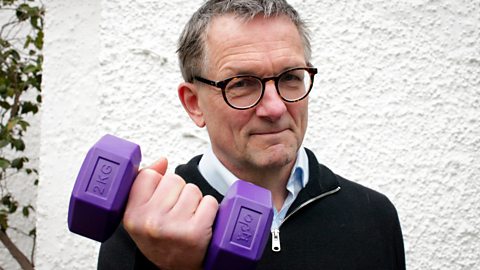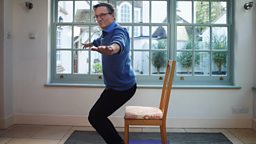How lifting weights could improve your body and your mind
“Pumping iron” may conjure up images of muscly gym-goers sweating though a workout accompanied by over-the-top music, but developing a weight-lifting routine can be done easily at home. And the benefits can be huge.
The pros of weight training (also known in various forms as resistance training and strength training) go beyond simply toning the body and stronger muscles and bones – it helps maintain a healthy heart and immune system and can even improve brainpower and help you live longer.
In Just One Thing, Michael Mosley shows how dumbbells are actually a very smart move for both your physical and mental capacities.
Lifting weights lowers blood sugar

Maintaining muscle mass is not just about how good it looks on the outside, it’s working for you inside too. As well as benefiting your waistline, weight training improves your metabolism and increases your insulin sensitivity, meaning it’s easier to lower blood sugar levels after a meal.
A decade-long study found that those with more muscle mass were at a lower risk of death across all major causes.
Your immune system is boosted by resistance training
A study comparing women who did no exercise with those who regularly did resistance training showed that the latter group had cells that were more active in helping the body fight infection.
Muscle mass is a key indicator of longevity
“By maintaining muscle mass, you can reduce your risk of chronic conditions, such as Type 2 diabetes and heart conditions,” says Dr Teresa Liu-Ambrose at University of British Columbia. In turn, the lower risk from chronic physical illnesses helps decreases the likelihood of suffering cognitive conditions such as dementia.
The benefits of resistance training appear to be limitless. A decade-long study of 3600 men and women over the age of 50 found that those with more muscle mass were at a lower risk of death across all major causes. Consequently, muscle mass can be considered one of the strongest indicators of longevity, more so than weight or body mass index (BMI).

"With strength training, people were able to remember things better".
Dr Teresa Liu-Ambrose explains her research.
Pumping iron could reverse the ageing process
There’s more good news. Not only can you work out in the knowledge that you are keeping illnesses at bay, you might also be reversing the ageing process.

When you’re weight training your brain is releasing “neurotrophic factors” that promote the growth of neurones.
A small scientific study asked 14 older people to take part in strength training (where the aim is focused on building muscle mass over general fitness) twice a week for a six-month period. When their muscle development was compared to younger adults, it was shown that the cells that generate energy (the mitochondria) were functioning at a similar level.
Exercise has a double whammy effect on cognitive function
The impact of exercise on the brain has mainly been focused on endorphin release, but the association is even more complex. A study of over-65s, including both healthy participants and those with a cognitive impairment, revealed that after strength training both groups showed improvements in associative memory (e.g. matching names to faces) and in decision-making.
The magic of myokines: what’s happening in your brain when you work out
When you’re weight training your brain is releasing “neurotrophic factors” that promote the growth of neurones, the cells that transmit nerve impulses. Key amongst them are myokines, which Dr Liu-Ambrose describes as “specialised hormones produced in muscles and released when muscles contract.” The role of myokines is to “travel throughout the body and go to different organs and tissues and jump-start a variety of biochemical processes.”
One of the functions of myokines is to produce BDNF (Brain-Derived Neurotrophic Factor), which Michael Mosley describes as “like a sort of fertiliser for the brain”.
Resistance training from home
If you're worried you might miss out on all these benefits unless you sign up for a gym, don't panic - fitness begins at home. To demonstrate this, Michael gives listener Jenny from Manchester a number of resistance training exercises that she can do in her kitchen. They include: a bicep curl, normally done with a dumbbell but which Jenny will do by holding a bottle of milk; calf raises, by holding on to a countertop and standing on tiptoe and, finally, weighted squats, which involves doing squats with a heavy article like a backpack filled with books.
Michael asks Jenny to do three sets of ten of each of these exercises over a week. Find out how Jenny got on by listening to Just One Thing.
If you are inspired to try your own resistance or strength training at home, don’t forget to check in with your GP beforehand.

















































